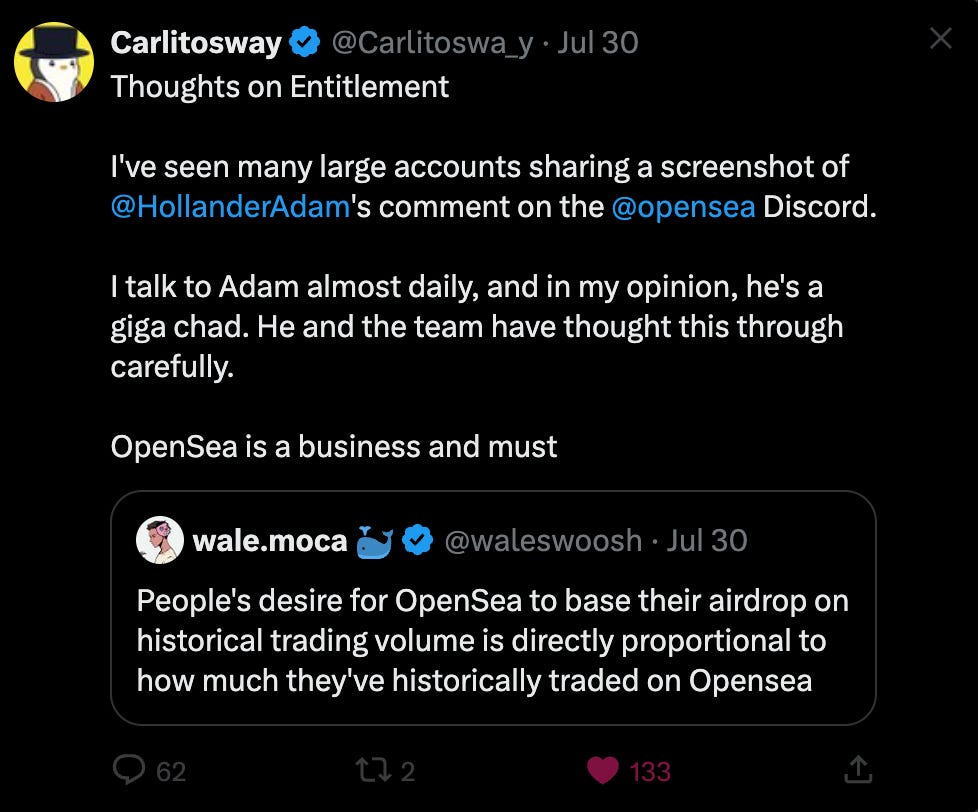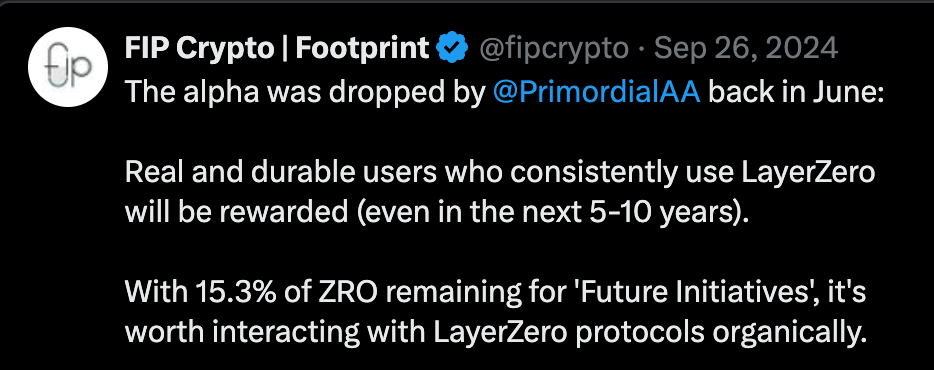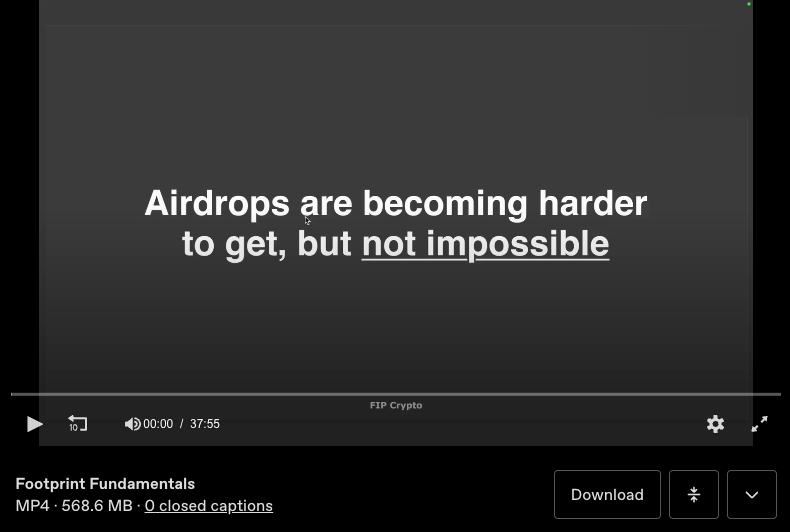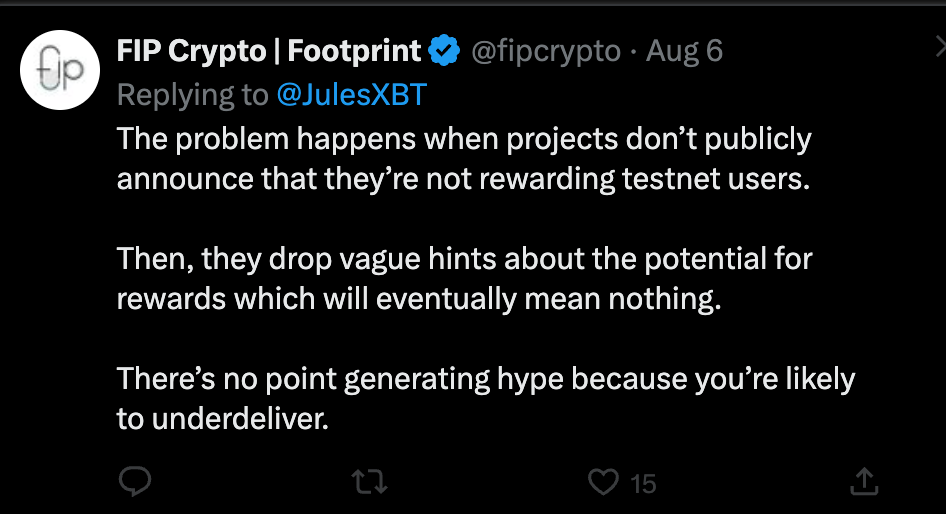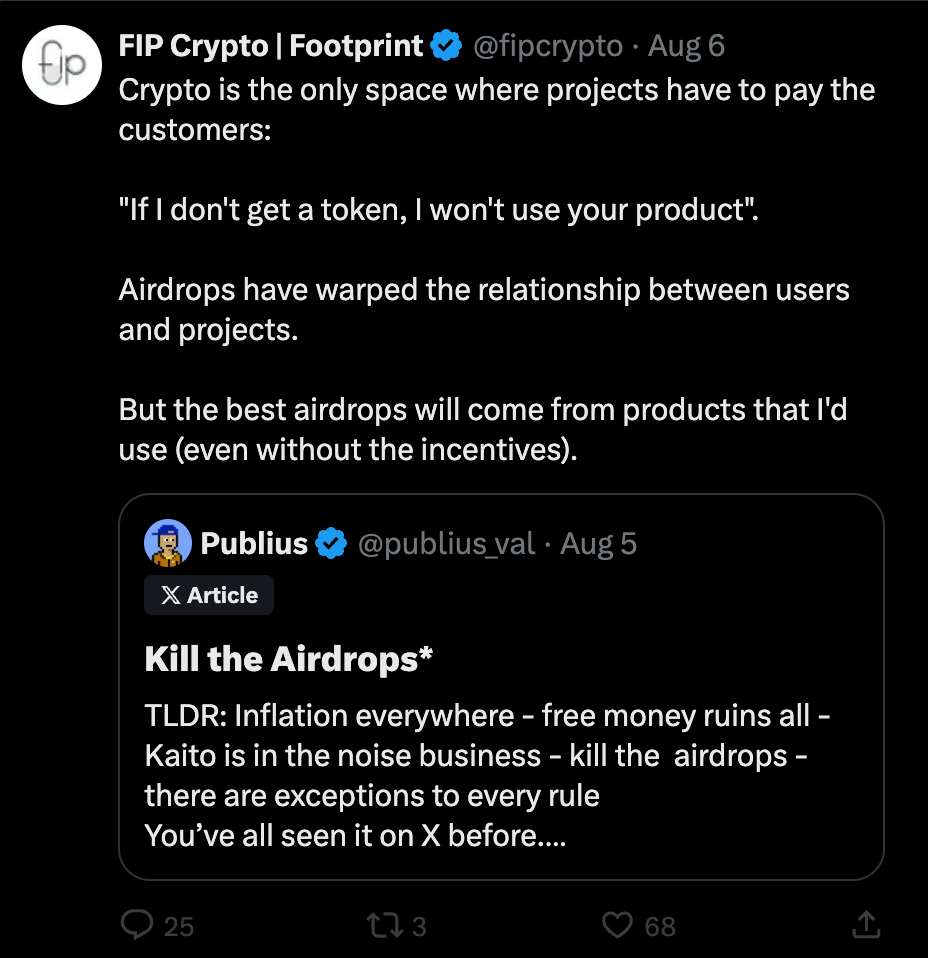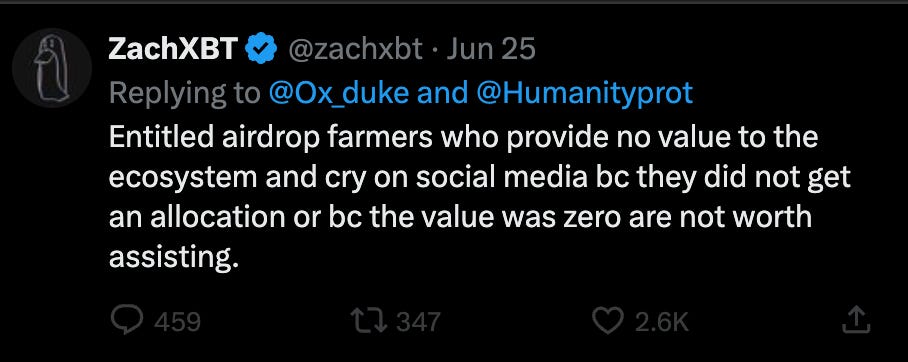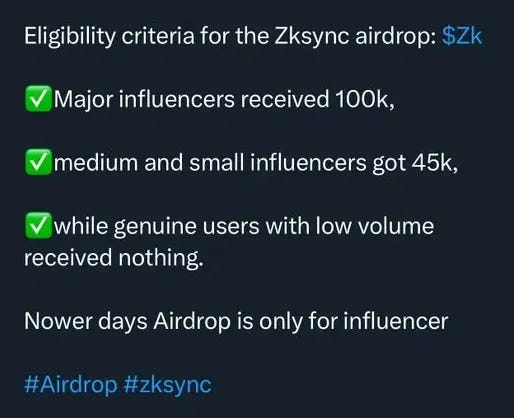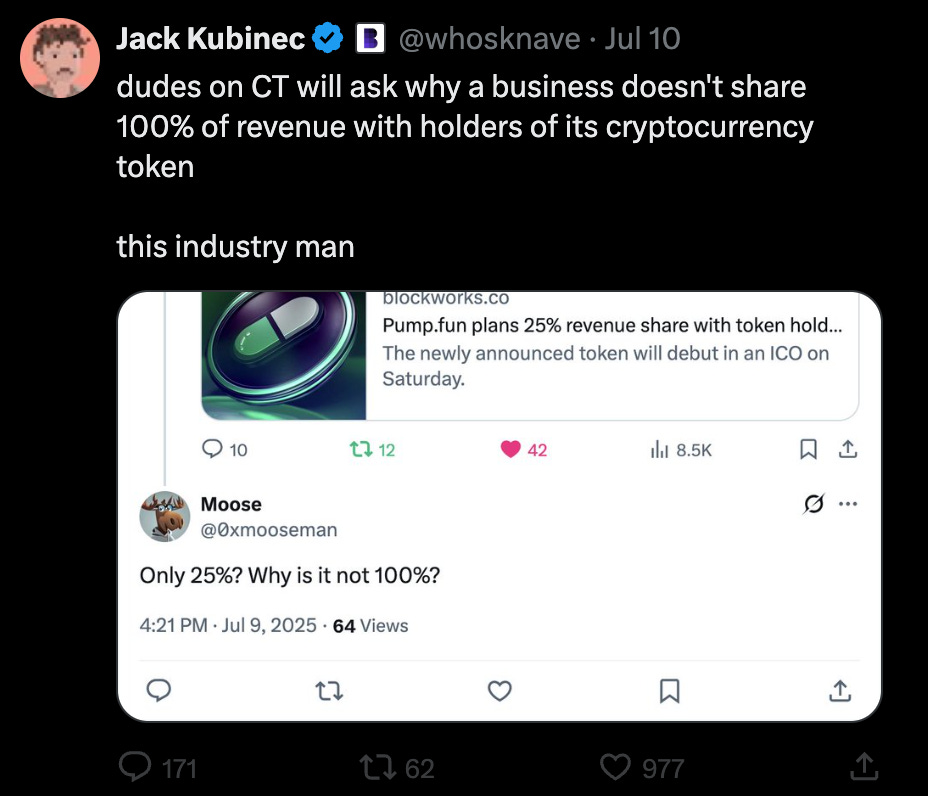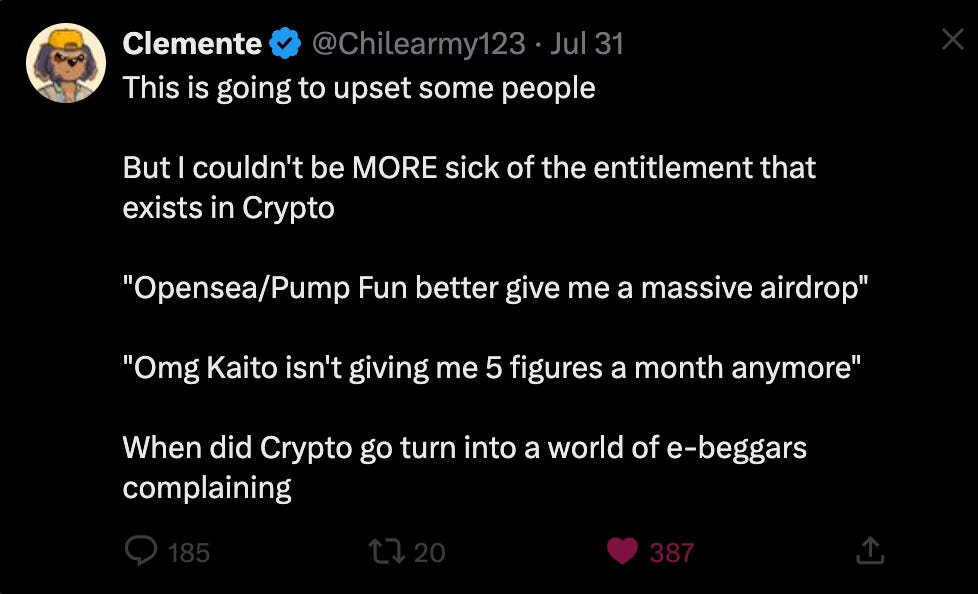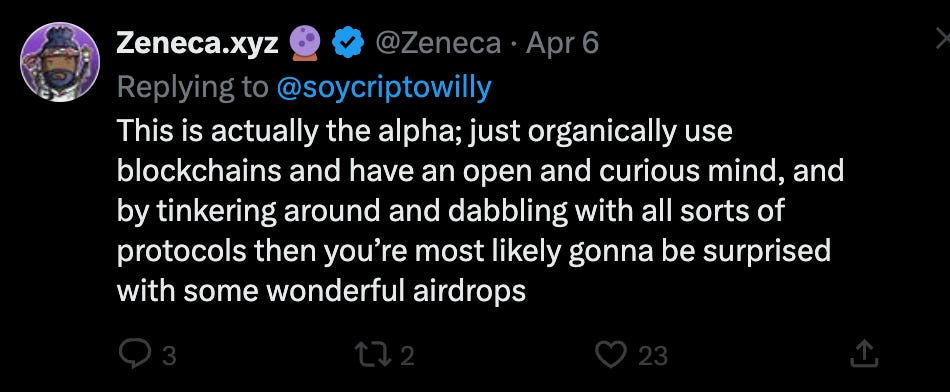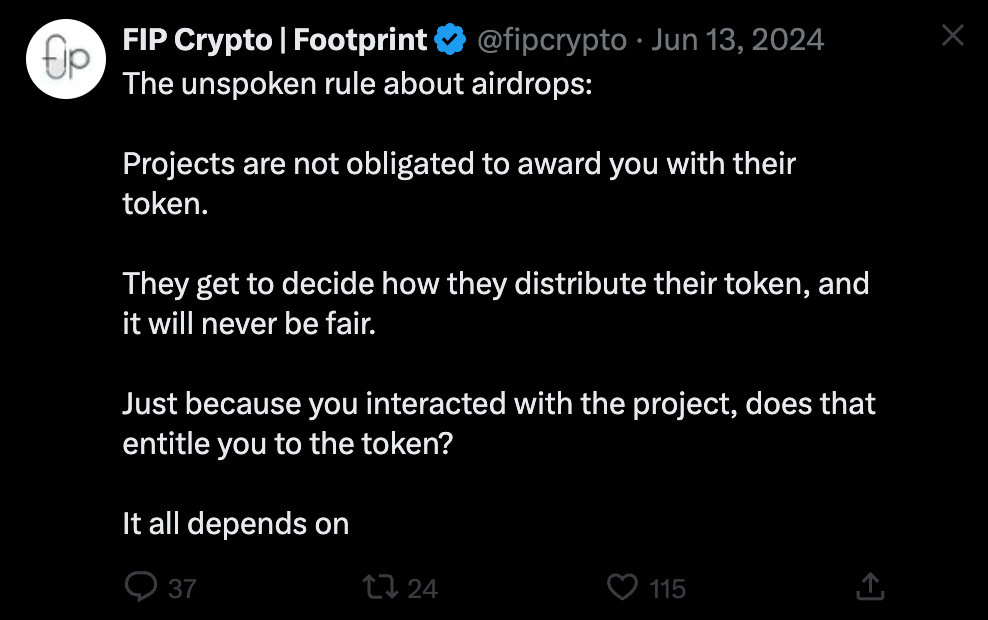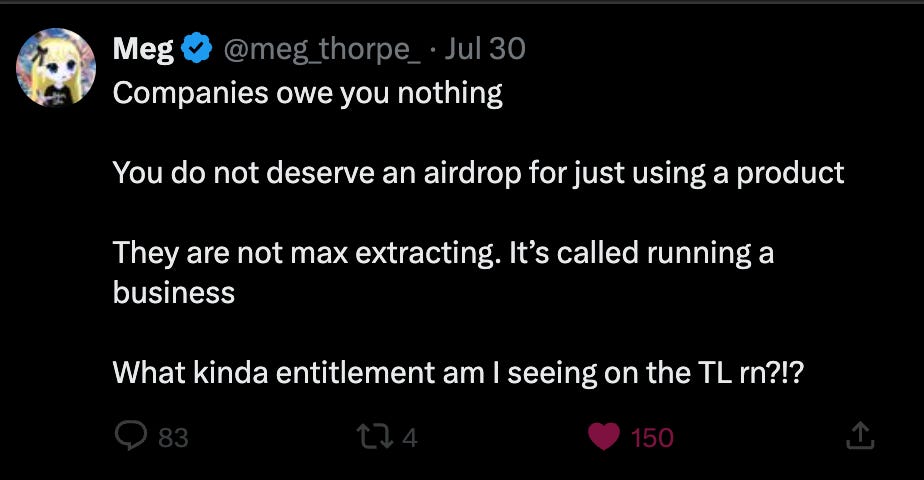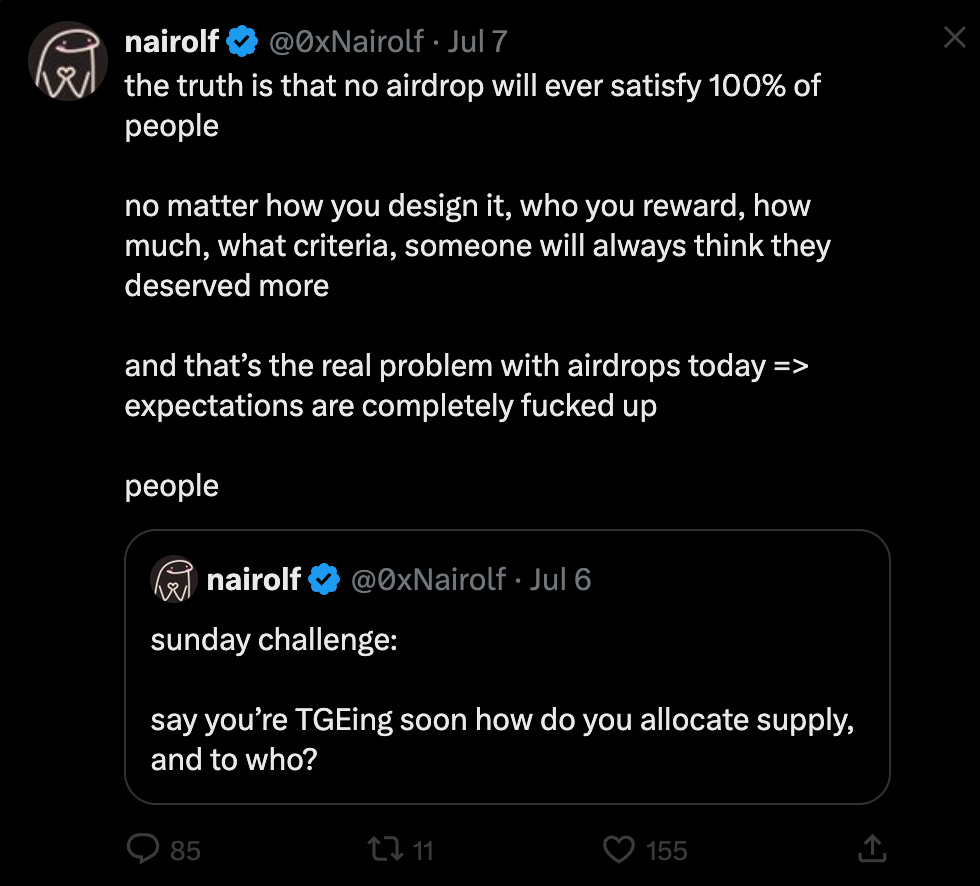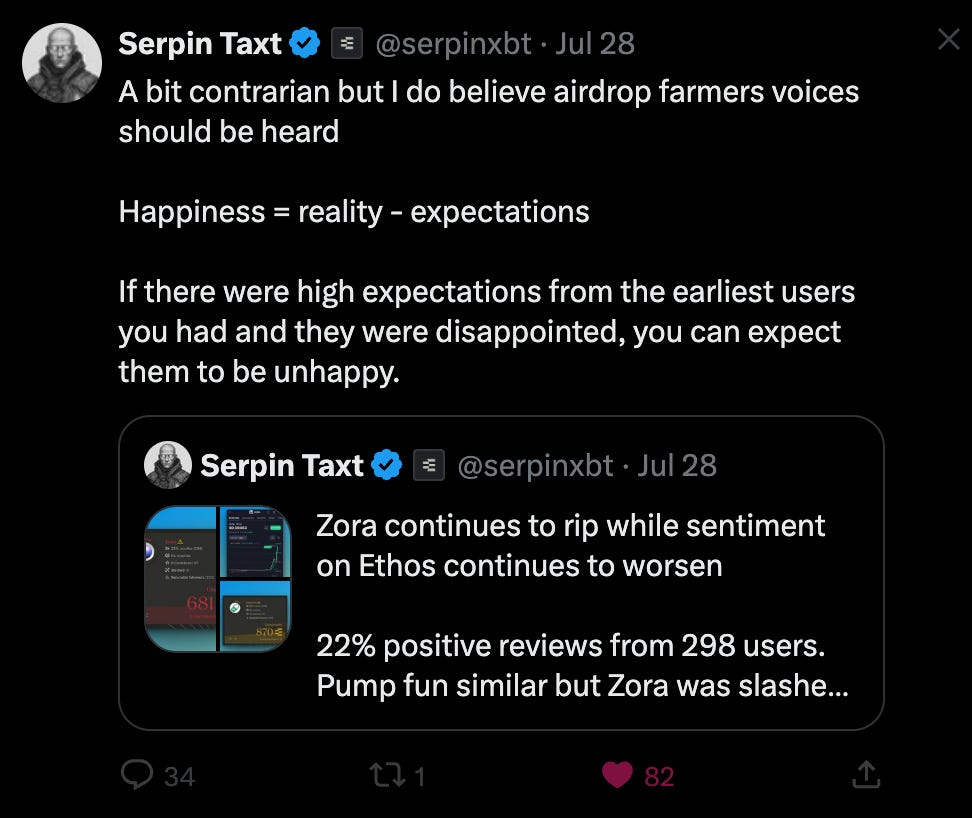The entitlement culture in airdrops is unbearable
Airdrops are the only space where people get angry about free money. Some expect a 5-figure airdrop for every project they interact with, but that’s not how any of this works.
We see the same scenario play out with every big airdrop:
Hype all over the timeline on a tokenless project
Accounts start bootlicking the project to rank on the Kaito leaderboard
Accounts get a lower allocation than they expected
They create drama all over the timeline and complain about their poor allocation
And it’s so tiresome and boring.
What used to be an amazing gift has turned into a toxic ritual that projects struggle to escape from.
And it all started when some received a good airdrop without interacting much:
How we got into this mess
Uniswap’s criterion for their airdrop was so simple:
All we needed was to call a Uniswap v1/v2 contract before the snapshot.
But this started a dangerous norm for other projects to follow:
Everyone expects them to do something similar and give back massively to their communities.
High expectations are pinned on every airdrop where they need to be life-changing and make their users at least 4-5 figures for them to be happy.
But that’s not always the case:
A project is not a charity, and they have to make money first.
Quoting from @divine_economy’s comment:
Crypto is the only place that throws money at its users, while others focus on generating more revenue.
But they’re becoming harder to get for this reason:
Sybils have ruined everything
It is not possible for projects to do an Arbitrum-style airdrop any more.
These metrics are easily gamed by Sybil farms, so if you’re doing the same actions:
You’ll be labelled a Sybil as well.
That’s why ZKsync chose to use TWAB as its main criterion instead of activity metrics.
It gets harder to identify real users, because Sybils are extracting from the entire system.
That’s why airdrops are harder now:
The criteria are getting stricter to weed out Sybils, and some real users will be filtered out too.
If their wallets have the same behaviour patterns as a Sybil.
Projects have also shifted their focus from airdrops as awareness tools to ones that are for retention.
Yes, they’ve also given more to Binance Alpha and other liquidity allocations, but it is what it is.
Those who care about their community would want to do right by them, but it’s hard to execute because of this:
Most users are only aligned with the paycheck
Projects want to reward durable users, ones who will consistently use the product because they like it.
But since we all know there’s a reward attached to this alignment:
We see accounts trying to fake their alignment all over the timeline:
Bootlicking posts that say how amazing the project is
Fawning over the team members and trying so hard to get their engagement
Generating hype over the project with overly positive language
It was so hard to use Twitter a few months back because of the “IP is inevitable” nonsense with Story.
And with the latest example, how many people really knew what Succinct does, or are they just regurgitating from the docs?
It’s so easy to do a pre-TGE project because everyone would hype up your project for you.
Everyone tries to be in the project’s ‘good books’ in hopes of a higher allocation.
But once the token launches, no one cares about it anymore.
They could get tons of haters too if they do this ‘wrongly’:
🔥 Want to beat 99% of airdrop hunters?
The future of airdrops is reputation.
If you’re still following the old playbooks, you're missing out on the highest allocation from airdrops.
Stand out from Sybils by building strong onchain and social signals to stay ahead in this new meta.
My 37-minute course equips you with all the fundamentals.
Get it for free with the link below:
The toxicity is mind-blowing
Yes, there will be projects that feed on hype, and this is a dangerous game to play:
The more the project overpromises, the higher the chances of underdelivering.
Some don’t help themselves either with vague hints to fuel speculation (that eventually backfire).
This leads to the mindset we now have:
We expect an airdrop for every action we take. Otherwise, we won’t interact with the project.
Whenever I post what I did, someone will ask me this question:
Will this interaction get me an airdrop?
And my template answer is that I have no idea.
My priority is to expand my wallet’s onchain footprint.
Because I know that the airdrops will come in the long-term once I build a credible onchain reputation.
And I’m not on the team either, so I won’t know what gets me the airdrop.
But many want instant gratification and to get their rewards ASAP.
And guess what happens when they don’t get what they expect:
They hurl toxic comments at the brand and team accounts just because they didn’t get the allocation they think they deserved.
ZKsync is a perfect example of this.
Till this day, there are toxic comments on their posts, mocking their token price and ghost chain.
We can be disappointed with our allocation, but there’s no reason to curse at the team, no matter how bad the airdrop is.
Even for Scroll, I don’t see a point in sh*tting on them just because of the airdrop.
Though there are big influencers who do this because it gets more engagement (as it’s the popular thing to do).
I’m guilty of putting out these cheap dopamine hits too, but it ultimately gives zero value to my audience (so I’ve stopped it).
If the focus is just on the rewards, we will burn out.
Especially if we’re doing this:
Comparison destroys our mental health
Here were some responses that I got after sharing my ZKsync allocation and Wenser stats:
I have a better ranking on Wenser, yet my allocation is way lower
Look at my wallet metrics, how does that deserve just a 4k allocation?
My metrics are way better than this
Major influencers are the only ones that get the highest allocation
And turns out, we were all comparing the wrong criterion because ZKsync ultimately used TWAB and not any of the Wenser stats.
The same thing happened for Caldera, where we got ‘peanuts’ for onchain users while Kaito yappers received 17k+ tokens.
But with the price of the token, it was a decent return just by exploring Caldera-powered rollups.
There will always be someone else who does better than us, and I no longer see a point in comparing.
This will make us want more and never be happy with our own allocation.
But I’ve stopped chasing airdrops and I’m doing this instead.
Let airdrops come to you
Airdrops are a transfer of value, but it doesn’t matter how much time and effort we put in.
We don’t get to decide how much value we’re giving to the project.
Because we’d all claim that we’re providing the maximum value so we deserve the maximum allocation.
The project gets to decide what contributions they consider as the most meaningful, and will reward them accordingly.
Yes, they can be wrong and it backfires spectacularly, but that’s life.
I do whatever I can based on my time and capital to contribute to the project.
Being open-minded and exploring new protocols will always be the easiest way to do this (while expanding my onchain footprint).
If they give me a nice allocation for my contributions, I’m grateful to the team.
If they give me a lower allocation than I expected, so be it.
We’re going in blind because everything we do is purely speculative.
No one owes you anything
Airdrops will never be fair.
There will always be someone who falls through the cracks, and it can be any one of us.
Yes, there will be those projects that farm users. I’m not saying that every project is perfect.
Some will fuel speculation with vague hints of a token, hoping that we’ll bite and start interacting with their product in hopes of the token.
Projects can go back on their own words and change the rules of the distribution at any time.
This is the game that we’re playing, and there’s no guarantee of results.
Just like everything else in life.
Many complain that airdrops are dead, but you either continue doing them or skip them completely.
There is no in-between. And there is no need to complain either.
We can’t control the outcome
With airdrops now getting harder, I’m treating them as a bonus.
I have to make money with my DeFi interactions first, with the airdrop being extra yield.
Yes, we are all here for the money, including me.
I wouldn’t even be in this space if not for wanting to make money with airdrops.
But if we focus too much on the outcome and have high expectations, we will burn out.
It becomes yet another job that we’ve fallen into, and one where there’s no guarantee of return for the time and effort we put in.
I want to do airdrops in a way that’s sustainable, and that’s by enjoying the process of exploring new protocols (instead of grinding tasks mindlessly).
Here’s an equation from @serpinxbt that holds true:
Happiness = Reality - Expectation
I have the same approach to airdrops as growing my Twitter account:
Give value freely with little (or even no) expectation of returns.
Sandy was right all along, though the reality of the Scroll airdrop was low to begin with.
We can’t control how many tokens we get from the airdrop, but we can control these factors:
Who we follow (are they full of drama or value?)
How many bases we cover when contributing to the project (based on our time and capital constraints)
What projects we interact with (there’s no point doing all of them, even if we had the time)
Time is our most valuable asset, and everything we do needs to optimise for the highest ROI on time.
And it all starts with choosing which projects are even worth our time.
There are so many opportunities out there, but only some are worth doing.
Here are the factors I use to spot these projects.
The 30-day challenge to go from zero to Signal Creator
Want to capture the next wave of airdrops? You need both onchain and social reputation.
Stop wasting hours on low-value tasks and start building habits and systems that projects will reward with bigger airdrops.
Build the foundations for a reputable brand in just 30 days with one actionable tip you can implement each day.
It’s time to stop burning out on low-value tasks:



